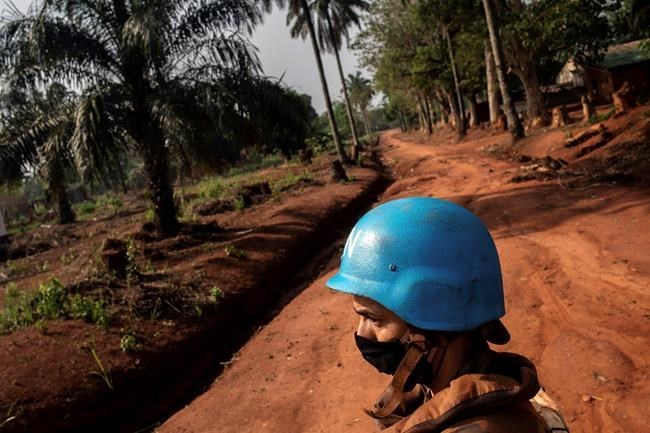Edith M. Lederer

Moroccan UN peacekeepers patrol Bangassou, Central African Republic, Sunday Feb. 14, 2021. An estimated 240,000 people have been displaced in the country since mid-December, according to U.N. relief workers, when rebels calling themselves the Coalition of Patriots for Change launched attacks, causing a humanitarian crisis in the already unstable nation. (AP Photo/Adrienne Surprenant)
March 12, 2021 - 2:17 PM
CAMEROON, Cameroon - The U.N. Security Council approved an increase of nearly 3,700 military and police to the U.N. peacekeeping force in Central African Republic on Friday to help reverse the deteriorating security situation in the conflict-torn nation where violence has increased since last December’s presidential election.
A council resolution, adopted by a vote of 14-0 with Russia abstaining, will bring the ceiling for military personnel to 14,400 and for police to 3,020.
U.N. Secretary-General Antonio Guterres recommended the increase last month saying the Central African Republic, known as CAR, is at “a critical juncture.”
The mineral-rich Central African Republic has faced deadly inter-religious and inter-communal fighting since 2013, when predominantly Muslim Seleka rebels seized power in the capital, Bangui. Mostly Christian anti-Balaka militias fought back, resulting in the killing of thousands and the displacement of thousands. The country saw a period of relative peace in late 2015 and 2016, but violence intensified and spread afterward.
A peace deal between the government and 14 rebel groups aimed at ending years of fighting was signed in February 2019. But violence blamed on CAR’s former president, Francois Bozize, and his allies threatens to nullify the agreement. It erupted after the constitutional court rejected Bozize’s candidacy to run for president in December.
President Faustin Archange Touadera won re-election in late December to a second term with 53% of the vote, but he continues to face opposition from forces linked to Bozize that contend he failed to meet the “good morality” requirement for candidates.
The resolution adopted by the council expresses “grave concern at the deterioration of the situation in the Central African Republic due to armed group attacks in advance of and following the election.”
It condemns violations of the peace agreement “in the strongest terms” and “violence perpetrated by armed groups and other militias, including violence aiming at obstructing the electoral process, incitement to ethnic and religious hatred and violence, ... sexual and gender-based violence in conflict, as well as violence directed at civilians from specific communities, resulting in deaths, injuries and displacements.”
The resolution stresses that the reinforcements for the U.N. peacekeeping mission, known as MINUSCA, are aimed at enhancing its ability to perform its mandate, especially protecting civilians and facilitating access for the delivery of humanitarian aid, “and at enabling the mission to enhance its capacity to prevent and reverse a further deterioration in the security situation while creating space for the political process to advance.”
The council welcomed president Touadera’s proposed roadmap for dialogue and called for “concrete steps” from the government and all political actors to engage in talks, resolve outstanding issues “and conclude the electoral process through the organization of legislative and local elections.”
Campaigning for this weekend’s second round of legislative elections is scheduled to end Friday, U.N. spokesman Stephane Dujarric said.
MINUSCA calls on all those involved to ensure voting is peaceful, “to refrain from violence and resolve any disputes through peaceful means,” he said.
News from © The Associated Press, 2021